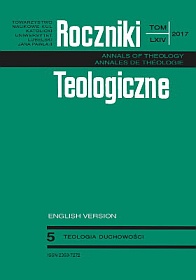Ecclesial Spirituality Against the Threats of Utilitarianism and Consumerism
Abstrakt
The paper presents ecclesial spirituality in opposition to anthropological threats brought about by utilitarianism and consumerism. It shows ecclesial spirituality from the angle of its (paradoxically) vertical fundament, derived from the “faith in the event” (Jean Daniélou) of the eternity plunging into the earthly sphere. It provokes the contemporary culture, contesting some of its canons. It also protects man against the expansion of those social trends which, reducing the status of a human person, answer its “desire for happiness” with offers such as: purchase, use and “letting off steam.” Utilitarianism and consumerism are animated by a spirit directed horizontally, leading man towards goods that are material, financial, ludic or prestige-oriented, characterized by short-term, “seasonal” usefulness. They do not bring the purchasers long-lasting satisfaction (of possessing and consuming), instead they raise “self-digesting passion,” which enforces a style of constant purchasing “something new” (fashionable today) and getting rid of “the old” (the previous season).Spirituality open to transcendence, based on evangelical vision of man and humanity faces the necessity of preserving its own identity from being contaminated by the “spirit of the times,” and of promoting anthropology in which man, multiplying goods (work, creativity, economics) uses them decently and honestly (ethical norms), preserving the ability to delay (“not now”) the experience of happiness and persistent (with faith) reaching for eternal perspectives.
Bibliografia
Bauman, Zygmunt. Consuming Life. London: Polity Press, 2007.
Baudrillard, Jean. The Consumer Society: Myths and Structures. London: Sage, 1998.
De Lubac Henri. The Splendor of the Church. Translated by Michael Mason. San Francisco: Ignatius Press, 1991.
De Vogüé, Adalbert. To Desire Eternal Life: Hope Yesterday and Today. New York: Fordham University Press, 2002.
Gałdowa, Anna. Powszechność i wyjątek. Rozwój osobowości człowieka dorosłego. Kraków: Wydawnictwo Uniwersytetu Jagiellońskiego, 2000.
Grygiel, Stanisław. Jestem, więc modlę się. Poznań: Wydawnictwo FLOS CARMELI, 2012.
Hostyński. Lesław. Wartości utylitarne. Lublin: Wydawnictwo Uniwersytetu Marii Curie-Skłodowskiej, 1998.
Hostyński, Lesław. Wartości w świecie konsumpcji. Lublin: Wydawnictwo Uniwersytetu Marii Curie-Skłodowskiej, 2006.
Kantor, Ryszard. Zabawa w dobie społeczeństwa konsumpcyjnego. Szkice o ludyzmie, ludyczności, powadze a w istocie o jej braku. Kraków: Wydawnictwo Uniwersytetu Jagiellońskiego, 2013.
Korzec, Cezary. “Prorok wobec zła i władzy (2 Sm 12,9).” Verbum Vitae 14 (2008): 17–38.
Mazur, Damian. “Szczęście w nabywaniu. ‘Samotrawiąca namiętność’ społeczeństwa konsumentów.” Logos i Ethos 22 (2016), no. 1: 77–91. DOI: http://dx.doi.org/10.15633/lie.1700
Mysona Byrska, Joanna. “Odpowiedzialność konsumenta w świecie konsumpcji.” In Społeczna odpowiedzialność gospodarki. Perspektywa interdyscyplinarna, edited by Stanisław Fel, 149–58. Lublin: Wydawnictwo KUL, 2014.
Mysona Byrska, Joanna. “Wpływ wartości świata konsumpcji na sferę publiczną.” Filo-Sofija 29 (2015), no. 2/1: 105–14.
Newman, John Henry. “Letter of 26 January 1833.” In The Letters and Diaries of John Henry Newman. Vol. III. Oxford: Oxford University Press, 1979.
Nowosad, Sławomir. “Antropologia i życie społeczne.” In idem. Moralne konsekwencje wiary. Szkice anglikańskie, 117–129. Lublin: Towarzystwo Naukowe KUL, 2016.
Paszkowska, Teresa. “Prestiż—potrzeba czy iluzja?” Pastores 43 (2009), no. 2: 35–43.
Probucka, Dorota. Utylitaryzm. Aksjologiczno-etyczne aspekty kategorii użyteczności. Częstochowa: Wydawnictwo WSP, 1999.
Ratzinger, Joseph. Introduction to Christianity. New York: Herder and Herder, 1969.
Ratzinger, Joseph. Pilgrim Fellowship of Faith: The Church as Communion. San Francisco: Ignatius Press, 2005.
Ratzinger, Joseph. Truth and Tolerance: Christian Belief and World Religions. San Francisco: Ignatius Press, 2004.
Ratzinger, Joseph./Benedict XVI. Jesus of Nazareth: Holy Week—From the Entrance Into Jerusalem to the Resurrection. San Francisco: Ignatius Press, 2011.
Ravasi, Gianfranco. Krótka historia duszy. Translated by Andrzej Wojnowski. Kraków: Wydawnictwo SALWATOR, 2008.
Ritzer, George, Jeffrey Stepnisky, and Jon Lemich, “The Magical World of Consumption: Transforming Nothing into Something.” Berkeley Journal of Sociology 49 (2005): 117–136.
Saja, Krzysztof. Język etyki a utylitaryzm. Filozofia moralna Richarda M. Hera’a. Kraków: Wydawnictwo AUREUS, 2008.
Sandel, Michael J. What Money Can’t Buy: The Moral Limits of Markets. London: Penguin Books Ltd., 2012.
Scheler, Max. Ressentiment. New York: Schocken Books, 1972.
Sennett, Richard. The Culture of the New Capitalism. New Haven: Yale University Press, 2006.
Warzeszak, Józef. “Antropologia Benedykta XVI na tle błędnych antropologii współczesnych.” Studia Teologii Dogmatycznej 1 (2015): 257–90. DOI: http://dx.doi.org/10.15290/std.2015.01.15.
Winter, Richard. Still Bored in a Culture of Entertainment: Rediscovering Passion & Wonder, Downers Grove, Ill.: InterVarsity Press, 2002.
Copyright (c) 2017 Roczniki Teologiczne

Utwór dostępny jest na licencji Creative Commons Uznanie autorstwa – Użycie niekomercyjne – Bez utworów zależnych 4.0 Międzynarodowe.





